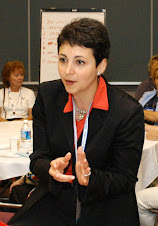I think most of us are waaaaaaay out of proportion. The fact that most of us do far more talking than listening is a no-brainer. What does take some thought is how we can engage in real, committed, attentive listening -- an incredible, memorable gift.
The International Listening Association (yep, there is one!) gives us the following stats:
- We usually recall only 50% immediately after we listen to someone talk
- We only remember about 20% of what we hear
- 35 business studies indicate that listening is a top skill needed for success in business
- Less than 2% of us have formal educational experience with listening (in fact, I am doing a full-day session on Listening Skills for the U.S. Army this March. I wanted to call it "Atten-TION! Slow Down and Listen Up!" but the Army didn't think this was as clever as I did. Oh, well.)
How powerful was that listening? Well, I still remember it six years later, and when I saw Janice this year at the General Assembly I reminded her about it, too. And you know what? She didn't need reminding. She remembered that conversation -- probably because she was really and truly present.
Now, without showing off, I must proclaim that I am among the 2% of people who have had formal training -- both through my Masters program in Social Work, and through my coach training program at Coach U. Despite what I have learned in the classroom (and what I have paid tens of thousands of dollars for), two more powerful things have taught me to be a committed, undistracted listener: 1) the sheer repetition of practicing my listening skills in every coaching conversation that I have and 2) my experience with Janice.
Who listens to you the way you deserve to be listened to? Who deserves your complete attention? How might turning off the blackberry, cell phone, and ignoring other distractions help you improve your relationships with colleagues, lay leaders, friends and family? What is your single biggest challenge? Let me know!
Deborah
www.myjewishcoach.com
www.jewishorganizations.blogspot.com
www.myjewishcoach.blogspot.com


